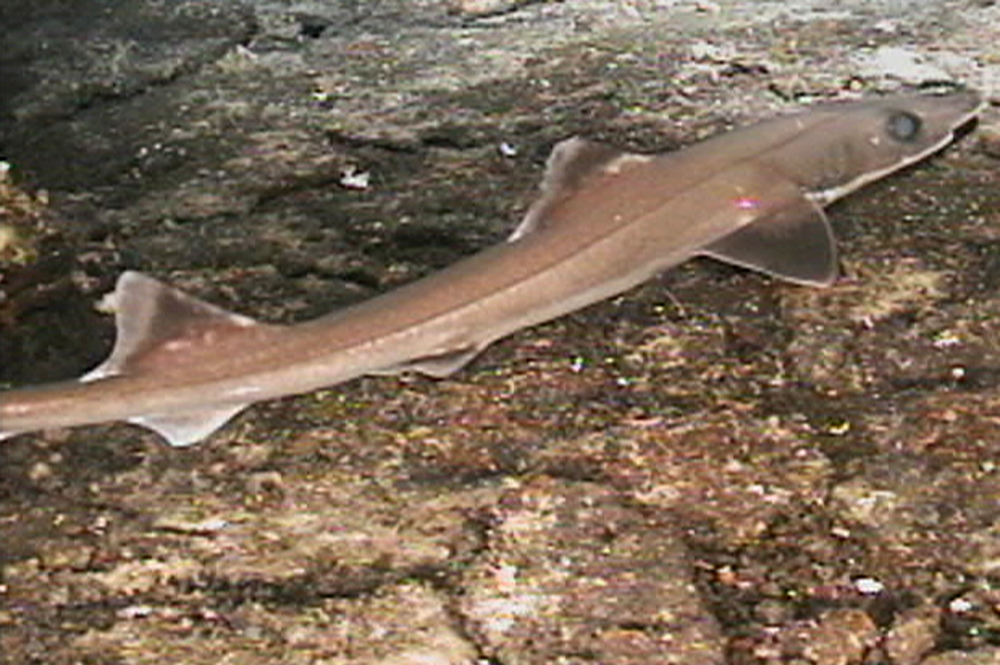Slender Smooth-hound , Gollum attenuatus (Garrick 1954)

A Slender Smooth-hound, Gollum attenuatus, at 550 m depth on the Macauley Seamount, New Zealand. Source: Hawaii Undersea Research Laboratory. License: CC By Attribution-Noncommercial-ShareAlike
A gollumshark with a very thin, slender body, a very broad flattened head, a long slender snout, a distinctively bell-shaped when viewed from above, and elongate oval-shaped eyes with a prominent ridge below each.
This deepwater shark lives near the bottom on seamounts and seamount chains. It was described from New Zealand and was only recently recorded from off eastern Australia.
Slender Smooth-hound , Gollum attenuatus (Garrick 1954)
More Info
|
Distribution |
Known in Australian waters from the Brittania Seamount (off northern New South Wales and Southern Queensland), in depths of 400-510 metres. Elsewhere the species is bathydemersal off New Zealand, in depths of 130-725 metres. |
|
Size |
Max length 110 cm TL |
|
Feeding |
Carnivore - feeds on fishes, cephalopods and other invertebrates suchs as crustaceans, brittle stars and gastropod molluscs. |
|
Biology |
The Slender Smooth-hound is ovoviviparous, meaning that the young are born live after developing from eggs rather than being attached to the uterus via placenta. The embryos feed on additional eggs and a special intrauterine milk produced by the mother. Females usually produce two pups per litter which are born at a length of about 40 cm. Individuals mature at 70 cm total length (TL), and grow to a maximum length of 110 cm TL. |
|
Fisheries |
Taken as bycatch in deepwater bottom trawls and long lines off New Zealand. |
|
Conservation |
|
|
Author |
Dianne J. Bray |
Slender Smooth-hound , Gollum attenuatus (Garrick 1954)
References
Compagno, L.J.V. 1973. Ctenacis and Gollum, two new genera of sharks (Selachii; Carcharhinidae). Proceedings of the California Academy of Sciences (Series 4) 39(14): 257-272.
Compagno, L.J.V. 1984. FAO Species Catalogue. Vol. 4. Sharks of the world. An annotated and illustrated catalogue of shark species known to date. Part 2 - Carcharhiniformes. FAO Fish. Synop. 125(4/2): 251-655.
Compagno, L.J.V. & V.H. Niem. 1998. Proscyllidae. Finback catsharks (pp. 1293-1295). In Carpenter, K.E. & V.H. Niem (eds.) FAO identification guide for fishery purposes. The Living Marine Resources of the Western Central Pacific. FAO, Rome.
Cox, G. & M. Francis, 1997. Sharks and rays of New Zealand. Canterbury Univ. Press, Univ. of Canterbury. 68p.
Dulvy, N.K. & J.D. Reynolds. 1997. Evolutionary transitions among egg-laying, live-bearing and maternal inputs in sharks and rays. Proc. R. Soc. Lond., Ser. B: Biol. Sci. 264: 1309-1315.
Francis, M.P. (SSG Australia & Oceania Regional Workshop, March 2003) 2003. Gollum attenuatus. In: IUCN 2012. IUCN Red List of Threatened Species. Version 2012.1. <www.iucnredlist.org>. Downloaded on 28 July 2012.
Garrick, J.A.F. 1954. Studies on New Zealand Elasmobranchii. Part III. A new species of Triakis (Selachii) from New Zealand. Transactions of the Royal Society of New Zealand 82(3): 695-702.
IUCN SSC Shark Specialist Group. Specialist Group website. Available at: http://www.iucnssg.org/.
Last, P.R. & J.P. Gaudiano. 2011. Gollum suluensis sp. nov. (Carcharhiniformes: Pseudotriakidae), a new gollum-shark from the southern Philippines. Zootaxa 3002: 17-30. Abstract
López, J.A., Ryburn, J.A., Fedrigo, O. & Naylor, G.J.P. 2006. Phylogeny of sharks of the family Triakidae (Carcharhiniformes) and its implications for the evolution of carcharhiniform placental viviparity. Molecular Phylogenetics and Evolution 40: 50–60. doi:10.1016/j.ympev.2006.02.011 PDF
Paulin, C.D., A. Stewart, C.D. Roberts & P.J. McMillan. 1989. New Zealand fish a complete guide. National Museum of New Zealand Miscellaneous Series. No. 19: i-xiv + 1-279, 8 pls.
Yano, K. 1993. Reproductive biology of the slender smoothhound, Gollum attenuatus, collected from New Zealand waters. Environmental Biology of Fishes 38: 59-71. Abstract
Yano, K. 1993. Distribution and food habits of the slender smoothhound, Gollum attenuatus, from the waters around New Zealand. Japanese Journal of Ichthyology 39(4): 345-356. PDF

